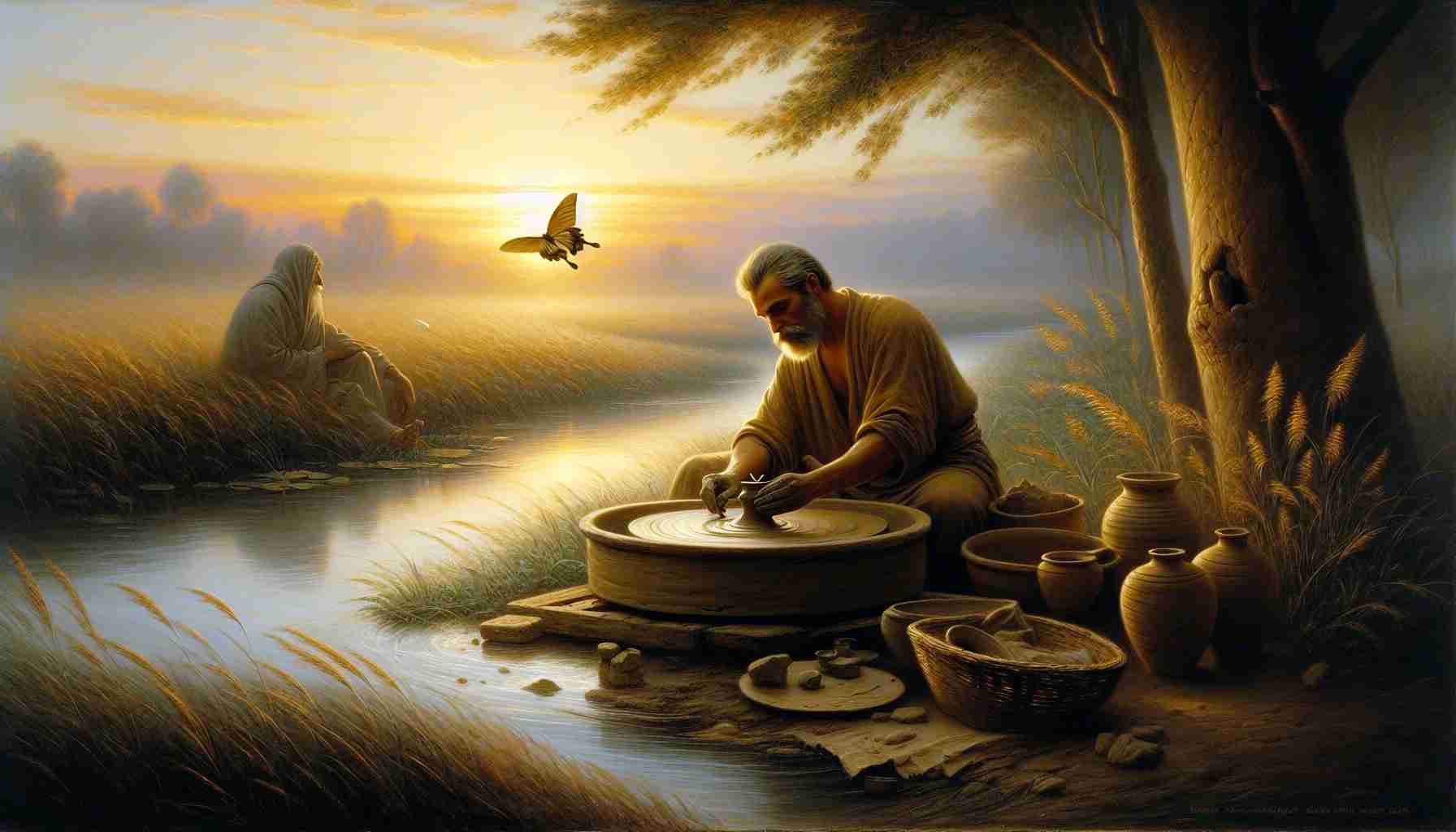

The early wind shook the trees as I crossed the far hills with my cart. My journey had taken weeks, and though my legs were tired, my thoughts were far busier. I was Jian, a potter from a small mountain village. I carried a wheel in my cart—my favorite pottery wheel, old and smooth, carved by my father’s hands. But something inside me was restless. My pots no longer brought me joy. I thought maybe, just maybe, I had to work harder, faster, do more to find peace.
It was near the village of Lu that I met the old man.
He sat beneath a tree, watching the wind blow through tall grass. His robe was faded, and his hat was made of straw. But his face held a calm that made the world around him feel still.
"Where are you going?" he asked, without looking at me.
"I’m looking for answers," I said. "The more I work, the less I feel like myself."
“Ah,” he said. “You carry your wheel, but have you ever wondered why the hole in the middle is so important?”
I blinked. “What do you mean?”
He smiled, then pointed to an empty space in his hand. “A wheel turns because of the space in the center. The hole is what makes it useful.”
I didn’t understand right away. “How can an empty hole be more important than the wood?”
He didn’t answer. Instead, he pointed to the sky where a butterfly danced on the wind. It didn’t flap hard. It simply floated, letting the breeze guide it.
He chuckled. “Zhuangzi once dreamed he was a butterfly. Or maybe the butterfly dreamed it was him. It didn’t matter. One became the other.”
I sat beside him, still confused, but quiet.
“The wind doesn’t try to blow,” he said. “It just does. And the butterfly doesn’t fight the wind. It lets go.”
I looked at my wheel, the big round one I spun every day to make bowls and jars. I thought about how I always pushed harder, faster, thinking more effort meant better pots.
But it was the hole that made the wheel turn. The stillness at the center.
And the butterfly... it didn’t push at all.
“So I don’t need to do more?” I finally asked.
He smiled. “Sometimes, doing less brings more.”
That night, I camped by the river. I didn’t touch my clay. I just sat and listened to the water flow. In the morning, I spun my wheel—slowly, gently. I didn’t force the clay. I let it move the way it wanted.
And what came from it... was the best bowl I had ever made.
I didn’t change overnight. But now, when I start to rush or push too hard, I remember the hole in the wheel. I think of the butterfly on the breeze. I breathe. I slow down.
And I let the Tao carry me.
The early wind shook the trees as I crossed the far hills with my cart. My journey had taken weeks, and though my legs were tired, my thoughts were far busier. I was Jian, a potter from a small mountain village. I carried a wheel in my cart—my favorite pottery wheel, old and smooth, carved by my father’s hands. But something inside me was restless. My pots no longer brought me joy. I thought maybe, just maybe, I had to work harder, faster, do more to find peace.
It was near the village of Lu that I met the old man.
He sat beneath a tree, watching the wind blow through tall grass. His robe was faded, and his hat was made of straw. But his face held a calm that made the world around him feel still.
"Where are you going?" he asked, without looking at me.
"I’m looking for answers," I said. "The more I work, the less I feel like myself."
“Ah,” he said. “You carry your wheel, but have you ever wondered why the hole in the middle is so important?”
I blinked. “What do you mean?”
He smiled, then pointed to an empty space in his hand. “A wheel turns because of the space in the center. The hole is what makes it useful.”
I didn’t understand right away. “How can an empty hole be more important than the wood?”
He didn’t answer. Instead, he pointed to the sky where a butterfly danced on the wind. It didn’t flap hard. It simply floated, letting the breeze guide it.
He chuckled. “Zhuangzi once dreamed he was a butterfly. Or maybe the butterfly dreamed it was him. It didn’t matter. One became the other.”
I sat beside him, still confused, but quiet.
“The wind doesn’t try to blow,” he said. “It just does. And the butterfly doesn’t fight the wind. It lets go.”
I looked at my wheel, the big round one I spun every day to make bowls and jars. I thought about how I always pushed harder, faster, thinking more effort meant better pots.
But it was the hole that made the wheel turn. The stillness at the center.
And the butterfly... it didn’t push at all.
“So I don’t need to do more?” I finally asked.
He smiled. “Sometimes, doing less brings more.”
That night, I camped by the river. I didn’t touch my clay. I just sat and listened to the water flow. In the morning, I spun my wheel—slowly, gently. I didn’t force the clay. I let it move the way it wanted.
And what came from it... was the best bowl I had ever made.
I didn’t change overnight. But now, when I start to rush or push too hard, I remember the hole in the wheel. I think of the butterfly on the breeze. I breathe. I slow down.
And I let the Tao carry me.